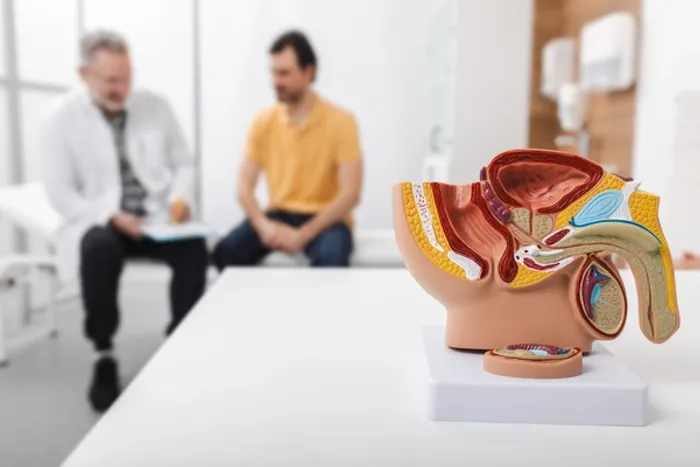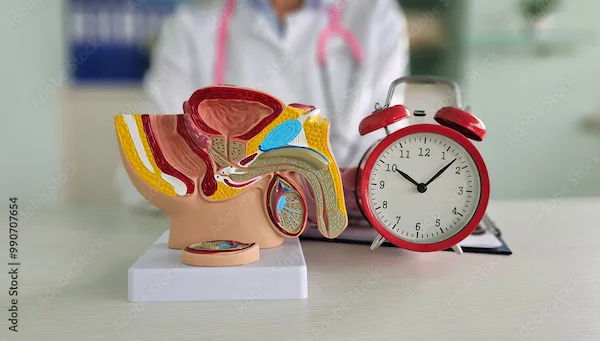Erectile Dysfunction Diagnosis: A Step-by-Step Guide to Finding the Cause
Discover how erectile dysfunction (ED) is diagnosed, what causes it, and how a clear diagnosis guides effective treatment for improved sexual and overall health.


Introduction
Erectile dysfunction (ED) is a common condition that affects millions of men, yet the thought of getting a diagnosis can feel daunting. Many men suffer in silence, fearing embarrassment or assuming it's just a normal part of aging. However, ED is often a warning sign of underlying health issues. A proper erectile dysfunction diagnosis isn't just about addressing sexual health; it's a critical window into your overall well-being. This comprehensive guide will walk you through the entire diagnostic process, demystifying the steps, explaining the tests, and highlighting the profound impact your lifestyle has on both the condition and the path to effective treatment. Understanding the "why" is the first and most important step toward reclaiming your health and confidence.
Understanding Erectile Dysfunction: More Than Just a Bedroom Issue
What is Erectile Dysfunction (ED)?
Clinically, erectile dysfunction is defined as the persistent inability to achieve or maintain an erection firm enough for satisfactory sexual performance. It's important to distinguish between occasional difficulties, which are normal, and chronic problems that occur more than 50% of the time. ED is not a disease in itself but a symptom of an underlying problem.
The Psychological vs. Physical Causes of ED
ED causes are broadly categorised into two groups: physical and psychological. Physical causes account for the majority of cases, especially in older men, and include conditions like cardiovascular disease, diabetes, high blood pressure, and hormonal imbalances. Psychological causes, such as stress, anxiety, depression, or relationship problems, can be either the primary cause or a contributing factor that worsens a physical condition. A key goal of the diagnosis for impotence is to determine the primary driver.
Consult a Urologist for the best advice
The Diagnostic Journey: What to Expect at the Doctor's Office
The Cornerstone of Diagnosis: Your Medical and Sexual History
Your first conversation with a doctor is the most important part of the erectile dysfunction diagnosis. Be prepared to answer questions openly about the nature of your problem, its duration, whether you have morning erections, and your overall sexual desire. You'll also discuss your full medical history, current medications, and lifestyle habits like smoking and alcohol use.
The Physical Examination: Checking for Underlying Clues
A physical exam helps identify physical causes of ED. The doctor will likely check your blood pressure, listen to your heart and lungs, and examine your genitalia and testes for abnormalities. A key part is assessing secondary sexual characteristics and checking for nerve sensation in the genital area.
The Psychological Evaluation: Assessing Mental Health Factors
Your doctor will explore potential psychological contributors. They may ask about your mood, stress levels at work or home, anxiety about sexual performance, and the quality of your relationship with your partner. This isn't about judgment; it's about painting a complete picture of your health.
Advanced Diagnostic Tests for Erectile Dysfunction
Blood Tests: Checking Hormones, Sugar, and Cholesterol
Blood tests are a fundamental tool. They can measure:
- Testosterone Levels: Low testosterone is a common contributor to low libido and ED.
- Blood Sugar (Glucose) and HbA1c: To screen for diabetes, a leading cause of nerve and blood vessel damage. Apollo24|7 offers convenient home collection for tests like HbA1c, making monitoring easier.
- Lipid Profile: High cholesterol can clog arteries, including those supplying the penis.
- Thyroid Function: An over or under-active thyroid can disrupt hormonal balance.
Ultrasound: Examining Blood Flow to the Penis
This is a primary test for vascular erectile dysfunction diagnosis. A Doppler ultrasound is performed on the penis, often after an injection of a medication that stimulates blood flow. This allows the doctor to visualise blood vessels in real-time, checking how much blood is entering the penis and how quickly it is leaking out, identifying venous leak or arterial blockages.
Overnight Erection Test (Nocturnal Penile Tumescence - NPT)
Most healthy men have 3-5 erections during REM sleep. This test involves wearing a simple device around the penis overnight. If the device records normal nighttime erections, it strongly suggests the cause of ED is psychological rather than physical. If nighttime erections are poor, a physical cause is more likely.
Get Your Health Assessed
The Powerful Impact of Lifestyle on ED and Its Diagnosis
The conversation about how lifestyle affects erectile dysfunction is paramount. Your daily habits are not just risk factors; they directly influence the diagnostic findings and treatment success.
How Diet and Obesity Contribute to Erectile Problems
A poor diet high in processed foods and sugars can lead to obesity, diabetes, and hypertension—all direct causes of ED. Excess body fat, particularly abdominal fat, promotes inflammation and reduces testosterone levels. During diagnosis, a doctor will closely examine BMI and dietary habits, as improving erectile function naturally often starts with nutritional changes and weight loss.
The Direct Link Between Smoking, Alcohol, and ED
Smoking is a major culprit. Nicotine constricts blood vessels, drastically reducing blood flow to the penis. Heavy alcohol consumption is a central nervous system depressant that can cause nerve damage, reduce testosterone, and lead to long-term liver damage that disrupts hormonal balance. Quitting smoking and moderating alcohol intake are often the first treatment recommendations.
Sedentary Lifestyle vs. Exercise: A Key Diagnostic Differentiator
Physical inactivity is a core risk factor. Conversely, regular exercise is one of the most effective natural remedies for ED. Aerobic exercise improves cardiovascular health and blood flow, while strength training can boost testosterone levels. A patient's activity level is a critical data point that helps a doctor understand the vascular component of their ED.
What Your Diagnosis Means: From Results to a Treatment Plan
Interpreting Your Results with Your Doctor
Once all the information is gathered—from history, exam, and tests—your doctor will help you understand the root cause. It may be primarily vascular, hormonal, neurological, psychological, or, most commonly, a mix of several factors. This clarity is empowering.
How a Clear Diagnosis Guides Effective Treatment Options
A precise diagnosis for erectile dysfunction dictates the treatment path. For vascular issues, PDE5 inhibitors (like Sildenafil) may be prescribed. For low testosterone, hormone therapy could be an option. For psychological causes, counseling or sex therapy is recommended. Crucially, for nearly every case, the prescribed treatment plan will include positive lifestyle changes for ED, such as the ones discussed above. If your condition does not improve after trying these methods, book a physical visit to a urologist with Apollo24|7 for a specialised evaluation.
Conclusion
Navigating the path to an erectile dysfunction diagnosis can feel like a journey, but it's one worth taking. It moves the problem from a source of shame and isolation to a manageable health condition with clear solutions. Remember, ED is often your body's way of signaling that something else is out of balance, often related to cardiovascular or metabolic health. By working openly with your doctor and embracing the investigative process, you're not just addressing a sexual concern—you're taking a proactive step toward a longer, healthier life. The findings from your diagnosis provide a roadmap, and whether the path involves medical treatment, lifestyle overhaul, or psychological support, the outcome is a chance to regain control and improve your quality of life. If you're experiencing symptoms, take that first step today and consult a doctor online with Apollo24|7 to start the conversation.
Consult a Urologist for the best advice
Consult a Urologist for the best advice
Dr S K Singhanina
Urologist
25 Years • MBBS/MS/DNB AND MCH UROLOGY
Guwahati
Apollo Clinic Guwahati, Assam, Guwahati

Dr. Sandeep Maheswara Reddy Kallam
Urologist
6 Years • MBBS, MS (General Surgery), M Ch (Genito-Urinary Surgery), Post Doctoral Fellowship in Uro-Surgical Oncology
Visakhapatnam
Dr. SANDEEP MAHESWARA REDDY K _- best Urologist in visakhapatnam, Visakhapatnam
(275+ Patients)

Dr. Pavan Kumar S K
Urologist
11 Years • MBBS, MS , Mch( Urology) DNB (Urology)
Bengaluru
Apollo Clinic, JP nagar, Bengaluru

Dr. Pradeep Champawat
Urologist
10 Years • MBBS, MS, DNB Urology
Delhi
Apollo Hospitals Indraprastha, Delhi
(175+ Patients)

Dr. Sudhakar G V
Urologist
25 Years • MBBS, MS(Gen.Surgery), DNB Urology
Bengaluru
Apollo Clinic, JP nagar, Bengaluru
Get Your Health Assessed
₹979(₹2448)60% off
₹100(₹250)60% off
₹649(₹1623)60% off
₹829(₹2073)60% off
₹709(₹1773)60% off
Consult a Urologist for the best advice
Dr S K Singhanina
Urologist
25 Years • MBBS/MS/DNB AND MCH UROLOGY
Guwahati
Apollo Clinic Guwahati, Assam, Guwahati

Dr. Sandeep Maheswara Reddy Kallam
Urologist
6 Years • MBBS, MS (General Surgery), M Ch (Genito-Urinary Surgery), Post Doctoral Fellowship in Uro-Surgical Oncology
Visakhapatnam
Dr. SANDEEP MAHESWARA REDDY K _- best Urologist in visakhapatnam, Visakhapatnam
(275+ Patients)

Dr. Pavan Kumar S K
Urologist
11 Years • MBBS, MS , Mch( Urology) DNB (Urology)
Bengaluru
Apollo Clinic, JP nagar, Bengaluru

Dr. Pradeep Champawat
Urologist
10 Years • MBBS, MS, DNB Urology
Delhi
Apollo Hospitals Indraprastha, Delhi
(175+ Patients)

Dr. Sudhakar G V
Urologist
25 Years • MBBS, MS(Gen.Surgery), DNB Urology
Bengaluru
Apollo Clinic, JP nagar, Bengaluru
More articles from Erectile Dysfunction
Frequently Asked Questions
What is the most common test for erectile dysfunction?
There is no single 'most common' test. The process usually starts with a blood test to check for common conditions like diabetes and low testosterone. A detailed medical and sexual history is often the most diagnostic tool itself.
Can a home test diagnose erectile dysfunction?
While there are home test kits for nocturnal erections (snap gauges), they are not a definitive diagnosis. They can provide clues but should be interpreted by a doctor within the context of a full medical evaluation. Self-diagnosis is not recommended.
How do doctors test for low testosterone as a cause of ED?
Doctors test for low testosterone with a simple blood test, usually taken in the morning when levels are highest. This is a standard part of the diagnostic workup for ED, especially if accompanied by low libido or fatigue.
Can lifestyle changes reverse erectile dysfunction?
In many cases, yes. For men whose ED is linked to obesity, poor diet, lack of exercise, or smoking, significant lifestyle changes for ED can lead to major improvements or even reverse the condition entirely. It is often the first-line recommendation.
When should I definitely see a doctor about ED?
You should see a doctor if ED is a persistent concern causing you stress or affecting your relationship, if it is accompanied by other symptoms like pain or curvature, or if you have underlying health conditions like heart disease or diabetes.








.webp)